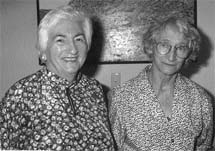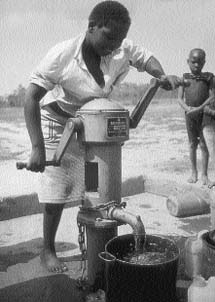Working with Women Worldwide
Following the recent meeting in Pretoria,
South Africa
of the Associated Country Women of the World,
Jenny Mitchell visited Tennant and spoke with
Gemma Buxton about the ACWW's aims.
Jenny Mitchell is the president for the
South Pacific area of the Associated Country Women of the World which
takes in eleven countries in the South Pacific area.
The Association aims to improve the conditions of women and children,
particularly in rural areas - to encourage education and self esteem.
It also raises money and funds some projects of different sorts, things
like bee keeping, piggery projects, water tanks or education. It facilitates
education and various types of home care and vegetable growing, nutrition
and like activities.
At the recent world tri-annual conference held in Pretoria, South Africa
about 700 women attended. The association comprises around nine million
members around the world in 71 countries with 365 societies counting
all countries.
The Country Women Associations in Australia are associated with the
ACWW, including the CWA of the Northern Territory.
The theme of the recent conference in Pretoria was 'Shaping Tomorrow's
World'. The resolutions resulting from this conference do have effect
because the ACWW has consultative status with the United Nations which
allows for direct access to the UN.
It has two women in each of the centres in Geneva and Vienna and New
York working full time with the United Nations and feeding in whatever
is appropriate to the policies that the ACWW have. Each country's delegates
are asked to take resolutions back to their own governments and lobby
their own government for the changes that have been moved.
It depends a lot on the government how much influence the society has
within that country. In places like Fiji, two of the members are Senators
in the Fijian government which makes it a lot easier. In Australia we
are very fortunate also because the Country Women's Associations have
direct access to the government, both Federal and State and Territory
governments.
The main issues this year were to ban the making, stockpiling and selling
of landmines. In the past the ACWW has asked for the banning of landmines
but not for the banning of the making of landmines. Although some of
the member societies' countries make big money out of manufacturing
landmines, it was passed unanimously.
Major issues affecting all countries included: deforestation, water,
female circumcision, the banning of the landmines and iodine deficiency
- in some places, including Australia, there is a real problem with
iodine deficiency.
The ACWW was started in 1933 as an organisation and the first conference
was held in1933, so the world conferences have been held for 65 years
now.
Over all these years one of the major issues has been the empowerment
of women and encouraging women to believe that they do make a difference
and that they can speak up. Delegates who get up and speak at a world
conference find it is a very enriching experience to speak in front
of all those representatives from other countries. The education of
people has always been a major thing that is talked about.
The conference runs for a week. One of those days is spent going out
to meet the local people. Bus loads of people go out to different areas
where they're entertained by the local people and get to see something
more of the local culture which is very helpful.
Caroline Joswig, a local member of the ACWW was also at the luncheon and Gemma asked her about issues discussed at the Pretoria conference which relate to the Barkly region or the Northern Territory.
They passed a resolution on literacy and
I'm hoping that it will be taken up in the Northern Territory because
I think there is a real problem with children not attending school.
It then follows that they are up till all hours and they're getting
into trouble, so I'm very keen to see that one taken up.
There was much discussion about AIDS. I don't think applies to us so
very much here but we were shocked because the AIDS percentage in Botswana
is 53% HIV positive. In South Africa, just over the border, they're
saying it's only 16%. This rather surprised us and we spent quite a
bit of time talking about AIDS and what we can do about it.
As we have done before, we discussed children and Television violence.
I do think that children take what they see on the television as a role
model, it does affect the children here, but I don't see how it can
be controlled. I really do think though, that the literacy thing should
be taken up here, it's not fair that these children are growing up without
schooling and the parents need to get them to school, I think that's
the big thing that we discussed that applies to the Barkly region.
The CWA of the Northern Territory will be having its annual meeting
on the Queen's Birthday up in Darwin. One of the things that came up
last year, and it is bound to come up again this year, is the quality
of water in Tennant Creek. This causes quite a bit a controversy.
We feel that the government should make an effort to improve the quality
of water here. It should be filtered - there are a lot of mineral salts
that could be filtered.
One of the big things on the ACWW's agenda is water. We think that in
general, Australia isn't looking after its water. It's very difficult
when you go to a world conference where your attention is on the third
world. Compared to the problems of other countries, we don't have problems!
We have such an excellent Social Security system and our problems can
be easily solved within Australia.
Nungalinya college in Darwin have had some funding from the ACWW mainly
to help the young women get their supplies. They go to TAFE and they
learn things like screen printing and tie dyeing, but then when they
want to setup and sell things, they need someone to help them get started.
We've done quite a bit of that up there.
This branch sent up a sewing machine to help them up there. But otherwise,
we don't do a lot of other things locally, so people feel that we're
not doing anything only because they can't see what we're doing. I was
very proud of Australia when I was at the world conference because the
Australian women actually supplied more funding to the world bodies
than the Americans did! I couldn't believe my ears! Although this branch
here when they meet, put just a small amount of money away each time,
it goes towards various projects. They do more here that what you might
realise.

Jenny Mitchell and
Caroline Joswig.

Pumping water in Zambia
as a result of the ACWW and UNESCO program 'Water For All'.